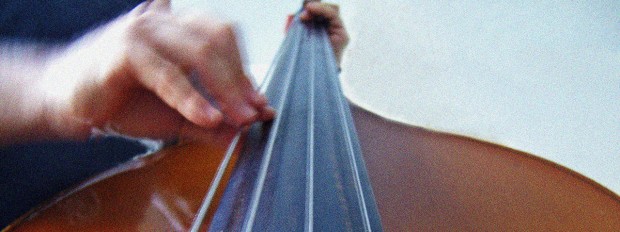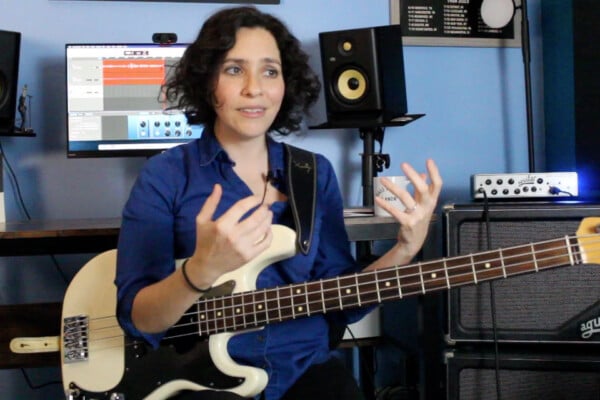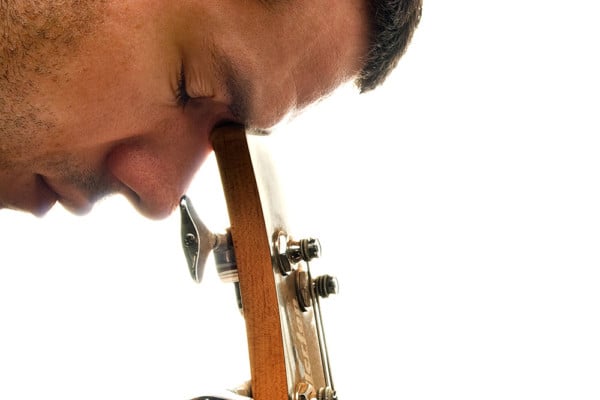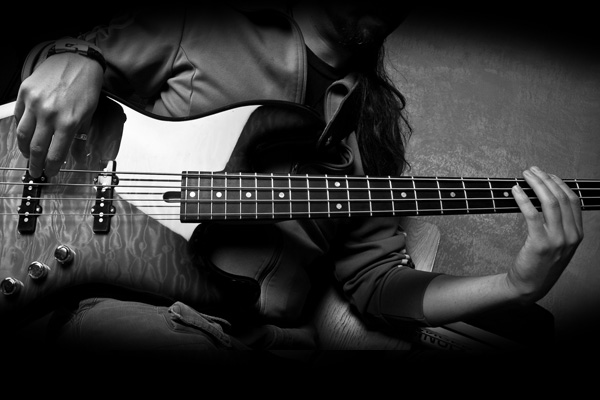Should You Study Double Bass To Improve Your Electric Bass Playing?

Q: I play electric bass. I’ve started taking some lessons here in Italy with a jazz player in order to study jazz and improvisation, and he has suggested I could study classical double bass at the Conservatory in order to have “serious” training. This idea fascinated me for a while, but now I’m starting to think: why should I study an other instrument in order to improve on bass guitar? Here classical studies seem to be the only way to get technique, but there’s plenty of bass players around the world with great skills that didn’t study classical double bass or classical guitar. If I were younger I would probably consider the idea, but I’m 28 now and I think I should focus on style and technique on my instrument. Furthermore, although the two instruments have the same role, there are a lot of techniques that cannot be applied on both. I appreciate classical music, but I think this way of facing the question is outdated and that there must be other ways of training a bass player. What do you think about this issue?
A: That’s interesting. I would suggest that you spend the time on the instrument you’re most passionate about. If you don’t have any inclination to play the double bass, it certainly doesn’t seem like it would be the best use of your time (especially considering how much time it would really take to start a new instrument and gain even a modicum of proficiency on it). The double bass is a very different instrument. You will understand the layout of the notes on the neck and what goes into playing a good bass line, but you will be starting over in most every other regard.
I would’ve have likely made that suggestion if you had expressed an interest in exploring the double bass and even then, I might not have implored you to enter into a Conservatory program unless that was truly what you wanted to do.
That said, the classical repertoire is very worth your time on any instrument. There is no reason why you can’t study the same materials and apply them to the electric bass. It really is great for your technique, articulation and your reading abilities. While much of the technique written about won’t directly apply, much of that is easily tackled with help from a teacher or an analytical mind.
Focus on clarity, articulation, maintaining a good one-finger-per-fret type hand position while making good use of your thumb as an anchor on the back of the neck. Classical guitarists are a great starting point, but there is no need to study classical guitar. Watch videos (instructional or performance), talk to guitarists or even take a lesson from a classical guitarist on your bass. Where’s the harm? Just apply what seems relevant to you and disregard what doesn’t apply to your instrument. I’m a big fan of taking lessons with non-bass players, and I’ve never thought to play anything other than bass while doing it.
It warrants saying that exploring other instruments is a great way to better explore music as a whole and will help you to become a better musician. But, save the four year Conservatory program and the money towards lessons and materials relating to the instrument that you actually plan on playing!
Have a question for Damian Erskine? Send it to [email protected]. Check out Damian’s instructional books, Right Hand Drive and The Improviser’s Path.




With the huge benefit of hindsight, I will say this: if you even think that you might have an inclination to pursue music as a career, study upright and get a performance degree. Yes, it is ridiculous that only a few expensive specialized musicschools offer electric bass degrees. Yes it is ridiculous that they are forcing you to major in “classical” music in an era where orchestras are folding by the month. However, a masters level performance degree is not only becoming a pre requisite to teach at the college level (eve as a adjunct), but it’s fantastic for your technique on both instruments, and it opens doors as far as orchestral music, musicals, and other “reading gigs” otherwise could not get. I wish I had done it when I had the chance.
It’s never too late John – it just get’s harder & required more discipline when your busier in life… I am finding it hard to keep up with double bass studies at the moment & regret not starting younger, BUT I’m now going to play on my double bass for a bit :) Frustratingly I’m about 50% slower, but better than never giving it a go & dying with a big regret… keep groovin’ ;)
I successfuly enrolled on a jazz degree – but had to pull out due to tendon problems in my hands… & I lost the opportunity for ‘free double bass lessons’ as part of my university education.
Fast foward 13 years – this year I decided to learn double bass age 33. I love it :) Best bass decision I have made to date… the jazz / folk bands I play in love the sound more than electric bass. I got motivated to give it a go after my initial school inspiration who was an electric bass genius has turned out to be a jazz double bass virtuoso, saw him gig this year which made me think double bass is worth exploring.
Luckily I’ve always used 1-2-4 fingering, so was not using the 3rd finger much. I took the view that with my limited practise time, I’d like to play double bass – rather than double thumb (which realistically you’ll NEVER be asked to sight read)… so I’ll never be a double thumbing bass god, but at least I might have more music opportunities from being one of the few double bassists out there.
My music reading, pitch intonation without frets, hand strength & musical awareness has improved massively. I only started 7 months ago after playing electric bass for 19 years…. it only becomes too late when your dead, but it is a lot harder when your ‘busier’ with life & not at the standard university education age – make the time to give it a go if you like the sound. Fortune favours the brave :)
PS : Great point Damian makes about learning from other instruments – I’ve joined a folk violin group on double bass & have been watching / learning violin bow technique carefully. I’ve also found brass players (mainly Saxophone) are MONSTER musicians – they have incredible ears & study the instrument very differently from most guitarists / bassist who start as tab readers that find reading music challenging.
Hey John, you’re just a kid! – I’m 59 and have been playing the electric bass since I was 19. I’ve been wanting to buy and learn how to play an uprights since someone lent me theirs for a few months about 25 years ago. I just messed around with it enough to realize how much I loved the organic nature of that instrument. and just feeling the powerful vibrations in my body directly from the instrument, without amplification.
Anyway, I got too busy in life, told myself I was too old to learn how to play it, and never got around to buying one. Well, I finally did so last month. That’s right. Learning a new instrument at age 59. I don’t even care if I ever get good enough to perform with it. I did it because I always wanted to do it and wasn’t going to leave this world without having owned and played an upright bass. I could care less if I get a single gig on it! You are correct: “It only becomes too late when you are dead.”
I agree with everything Paul G Said. I have loved the sound of Double Bass all my life (55). (Playing electric since I was 12). Got one for my 50th. Can’t find a teacher in this area, but have been playing it off and on. 1st thing I noticed was it showed me how not to overplay Rock ‘n Roll! Take it to a Thursday Jam and have gigged it – but not ready for a Jazz gig yet.
Lot’s of advice, videos and documentation online. My main concern, starting without a teacher, was injury and bad technique. I took it out to play 1\2 songs on a gig one night. Ended up playing it for three hours. My back! My arms, my legs… nothing prepares you for that!
Simple answer here: If you don’t want to play string bass – don’t. I play string and electric bass simply because I chose to. I was watching a jazz fusion band years ago with a very accomplished string bassist who played his solos with a bow. I had never seen or heard such a sound in a club setting. I asked the bassist while he was on his break how long it would take to get good on string bass. He said, “Ten years.” I was 21 at the time and had been playing electric for 3 years. When he said, “Ten years”, my exact response was “I’ve got ten years” because I had decided on the spot that I was becoming a string bassist. You shouldn’t play any instrument, for any reason, if your heart is not in it.
After playing electric for years, I bought an upright because I was curious to learn. After some time I sold it, but the experience did teach me a lot and has changed how I play electric. For example, I felt the upright playing position was more ergonomic and comfortable on my wrist, and now have adapted my electric and strap to more closely resemble the upright vertical neck.
Forget that! Rock a Squire P, get popular with a pop rock band on YT, make it big and rake in 500% more cash in a year than any classical musician will ever make in their entire career. You’ll be making money while he’s selling the car to help pay for the upright ;)
I jest.
But not really.
In my personal experience I say, not just double bass, but studying ANY other instrument will benefit your electric bass playing. Why? it gives you perspective, and understanding of music as a whole, not just bass. My upright playing has most definitely benefited my electric playing. I am more aware of sound production, the tone and envelope of each note. My fretless playing improved tremendously. My walking bass lines sound more authentic because I know what works and what does not on an upright. I would not say playing upright is a requirement for playing electric, but without a doubt, it is a good idea. The electric bass is technically part of the guitar family, but the truth is, it borrows qualities from both guitars and double basses, and it is possible to apply both guitar and double bass techniques on the bass guitar.